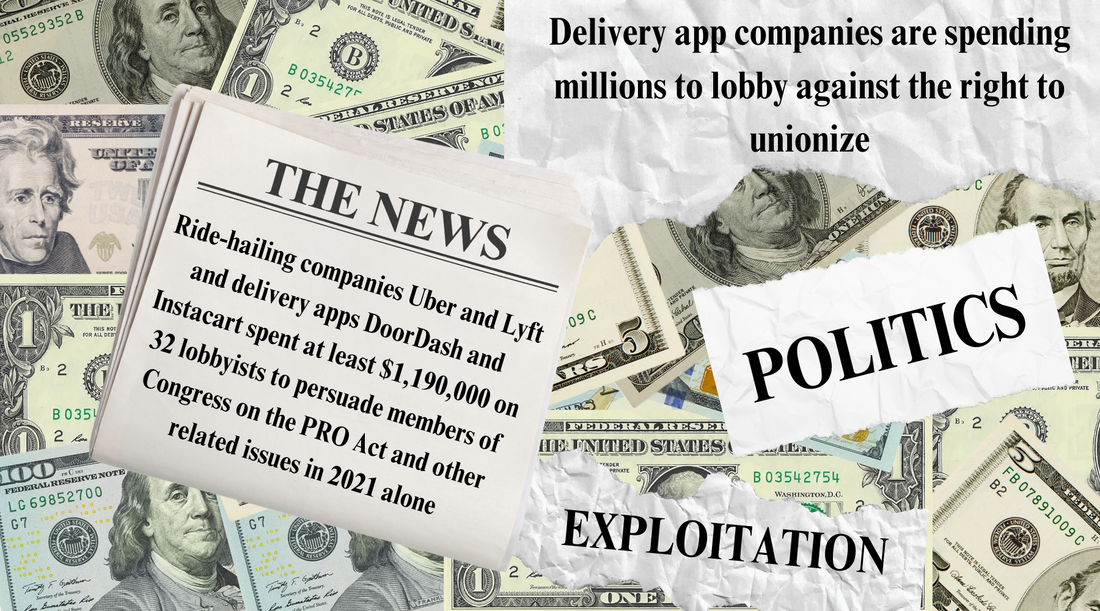Popular Posts
Join the Movement
Stay updated on the latest news about the gig economy.
Related articles
The Delay in Reclassifying Gig Workers

Why State and Federal Governments Hesitate to Redefine Employment Status
by Marta Cattaneo
In the ever-expanding realm of gig economy giants like UberEats, Instacart, and DoorDash, a longstanding and contentious issue persists: the classification of delivery workers as independent contractors rather than employees. Despite growing calls for reform, the question remains—why have these tech companies been allowed to maintain this classification for so long, with little change in sight?
One key reason for the status quo lies in the legal ambiguity surrounding gig work. Current labor laws were crafted in an era that didn't anticipate the rise of app-based platforms. As a result, the existing legal framework hasn't kept pace with the evolving nature of employment, leaving room for rampant exploitation.
The financial health of these gig economy platforms plays a significant role in their lobbying efforts. Uber Eats, for instance, has never turned a profit, and DoorDash's financial picture has been similarly precarious. Its IPO filing in 2020 revealed just one quarterly profit, buoyed by the pandemic, before returning to a loss, as reported by the Wall Street Journal. In the venture capital world, this spending-to-make-money business model is common, showcasing the substantial financial resources these billion-dollar companies have at their disposal—a budget that includes funds allocated for lobbying.
Tech companies wielding considerable influence and resources have engaged in extensive lobbying efforts. These endeavors aim to maintain the independent contractor classification, arguing that it provides flexibility for workers and is integral to the gig economy's functioning. These lobbying activities have, in some instances, slowed down legislative efforts to redefine employment status. Reports indicate that the major players in the gig economy—Uber, DoorDash, Instacart, and Postmates—have collectively spent substantial sums in lobbying efforts. After a reported state-record $200 million spent on Prop 22 in California, these companies continued their spending spree to influence federal lawmakers. The gig economy players reportedly spent at least $1,190,000 on 32 lobbyists to sway members of Congress on the PRO Act and related issues in 2021 alone.
In a filing to the SEC, Uber listed the prospect of drivers being classified as employees as an operational risk. "Any such reclassification would require us to fundamentally change our business model, and consequently have an adverse effect on our business, results of operations, financial position and cash flows," Uber wrote.
In other words, shifting to an employee model could entail substantial increases in operational costs. From providing employee benefits to complying with labor regulations, the financial burden on the company could be significant.
This disclosure raises pertinent questions about Uber's priorities. While the company allocates millions of dollars for lobbying efforts and executive compensation, it appears reluctant to invest millions in ensuring fair wages for its drivers. The stark contrast in financial allocations underscores a morally reprehensible choice: spending millions to avoid providing substantial benefits and wages to their workers.
The responsibility for the millions of dollars in lost wages, however, extends beyond Uber. Lawmakers, who play a crucial role in shaping and regulating the gig economy, must be held accountable. The influence of these tech giants on legislation and votes raises concerns about the integrity of the democratic process. To address this issue, a comprehensive and transparent review of lobbying practices and their impact on legislation is imperative.
It's time for legislators to prioritize the well-being of workers! Establishing clear guidelines for fair wages, benefits, and worker protections within the gig economy can serve as a foundation for legislation. Additionally, revisiting and strengthening labor laws to adapt to the evolving nature of work is essential.
Lawmakers must refrain from bowing to corporate influence and lobbying pressures. The responsibility falls on legislators to champion the rights of workers and ensure that the benefits of technological innovation are shared equitably across society.
Comments
No comments
Leave a comment
Your Email Address Will Not Be Published. Required Fields Are Marked *



0 comments